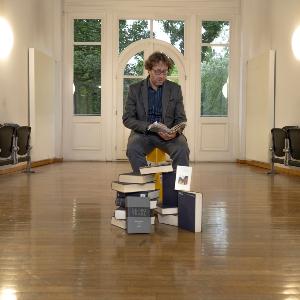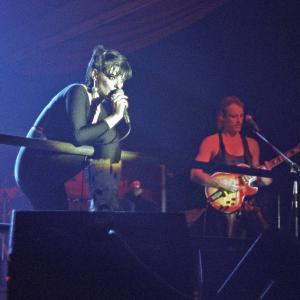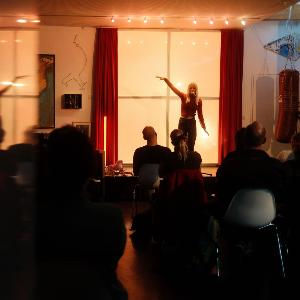“Poems can change lives”
29 Jul 2024
Verses that stick in the mind: An interview with literary scholar Frieder von Ammon on the ubiquity and timelessness of poetry.
29 Jul 2024
Verses that stick in the mind: An interview with literary scholar Frieder von Ammon on the ubiquity and timelessness of poetry.

© LMU
You recently received a very large number of replies to an interview with [influential German weekly] Die Zeit that was published under the critical heading “Do we need poems?” Is poetry more widespread and more popular than is generally assumed?
Frieder von Ammon: I am sure it is. There are large numbers of people who write poetry in different phases of their life, some of whom have no literary ambitions whatsoever. For them, it is part of everyday life, a kind of self-therapy.
Notwithstanding, poems hold connotations of being elitist and anachronistic. For many people, that creates an obstacle to even concerning themselves with poetry. If a 13-year-old today admitted that he writes poetry, that would probably harm his standing in his peer group. I think that is a pity.
On the other hand, a 13-year-old might listen to rap music – and thus to a different kind of verses?
Exactly. In my teaching, I try to convey a sense that much of the material that students have positive and productive dealings with is in fact poetry, although they are not even aware of the fact. That is especially true of song texts. Scarcely anyone would hit on the idea that song lyrics by Taylor Swift, Metallica or whoever can also be read as poetry. But they can. And as soon as you have made that clear, people start to lose their inhibitions about poems.
Do you have an example of a song that scans well as a poem?
Yes, I’ll be happy to quote one. You might not say that these lyrics are particularly beautiful in the conventional sense. But they are very interesting and, in some cases, very topical: I am talking about the Nina Hagen Band’s first record in 1978. The record contains excellent songs with fantastic lyrics – one example being Unbeschreiblich weiblich (Indescribably Feminine). It is a rebellious, provocative song about abortion, an act of female self-empowerment that must be seen in the context of the feminine discourse of the day. These are verses that stay in the mind, because they so succinctly sum up a certain position and the emotions that go with it:

live at the Rotation, Hanover in 1978 | © IMAGO Future / Image
Why should I do my duty as a woman?
For whom?
For them?
For you?
For me?
I don’t want to do my duty.
Not for you,
Not for me.
I have no duty.
English translation of an excerpt from the lyrics of the 1978 song Unbeschreiblich weiblich (Indescribably Feminine) by the Nina Hagen Band.
Do you expect the verse of a poem to stick in the mind?
I want to be careful in saying what I expect of poems, because I always try to stay as open-minded as I can. But when verses are so pithy that you never forget them, that is definitely an indication of quality.
Think of Goethe’s Prometheus, for example, and the way it starts: Bedecke deinen Himmel, Zeus, / Mit Wolkendunst! (Cover your heavens, Zeus, / With cloud vapor!). That is an amazingly good opening that you will never forget. Or Shakespeare’s 18th sonnet: Shall I compare thee to a summer’s day? You can’t get better than that.
Cover Your heavens, Zeus,
With cloud vapor
And try your strike, as a boy
Beheading thistles,
Against oaken tree and mountain height;
You still must leave me
My Earth standing
English translation of the first verse of Johann Wolfgang von Goethe’s poem Prometheus, first published in 1785.
You sometimes have to get to a certain age to be able to perceive poems in the manner they deserve.Frieder von Ammon
On the other hand, there are verses that stay with you even when you don’t want them to. Kraftwerk's Wir fahr’n fahr’n fahr’n auf der Autobahn (We drive, drive, drive down the freeway), for instance.
For me, Herbert Grönemeyer’s Flugzeuge im Bauch (Airplanes in my stomach) was another example. It imprinted itself on me as a child precisely because I didn’t like the words. For me, the imagery was too brutish. It was not until later that I asked myself whether precisely this brutishness made it an appropriate expression for an overwhelmingly negative feeling that threatened to tear you apart from the inside out. You sometimes have to get to a certain age to be able to perceive poems in the manner they deserve.
Feel empty and used up
Everything hurts
Got airplanes in my stomach
English translation of an excerpt from the lyrics of Herbert Grönemeyer’s 1985 song Flugzeuge im Bauch (Airplanes in my stomach).
I get the feeling that, precisely at the present time, which I see as a highly productive phase for poetry, a tremendous amount of experimentation is going on.Frieder von Ammon

in the Lyrik Kabinett | © Pierre Jarawan
You said earlier that there is something elitist about poetry. But are modern formats such as slam poetry not opening it up? And does this not change the very act of writing poetry?
Yes, they are, and it does. Poetry has gained fresh popularity in some circles as a result. From a historical perspective, it is, of course, remarkable that something which appears to be a completely new development is in actual fact merely an update to an older tradition: Reciting poetry to an audience with or without musical accompaniment, for example, is a pre-modern tradition that seemed to have been long forgotten but has now resurfaced and become relevant once again. The writing of poetry is naturally in a permanent state of flux. However, I get the feeling that, precisely at the present time, which I see as a highly productive phase for poetry, a tremendous amount of experimentation is going on.
Why is that?
There are certain conditions that, in this regard, have a positive effect: publishers who are willing even to publish poetry that is not mainstream, and literature houses – in Munich, the main one is the Lyrik Kabinett – who give poets a stage and pay them a reasonable fee. The poetry scene itself is now bigger and better connected than it used to be. And there is more interest among audiences.
All in all, poetry enjoys greater visibility today. I can say that merely by looking back at my studies in the 1990s. Back then, poetry played only a bit part at the universities, for example. That has changed in the meantime.
But to see these developments in their proper context, you need a little historical distance. In some respects, we are blind to what is happening in our own day.
Poems can achieve a tremendous amount. They can change lives, open up insights, create a sense of community, convey secret messages, challenge rulers, make scholars’ head spin, be sung joyfully.Frieder von Ammon
Where does this revived interest come from? What can a poem achieve?
Poems can achieve a tremendous amount. They can change lives, open up insights, create a sense of community, convey secret messages, challenge rulers, make scholars’ head spin, be sung joyfully. There is a polyfunctional side to poetry that can play a hugely important role in all kinds of different contexts, even everyday ones. You can’t say the same about novels, although they too can achieve a great deal. And I in no way want to play these two categories off against each other.
One central aspect is for sure: Poetry is a medium that lends itself exceptionally well to expressing emotions. If I think of Sappho, the first great female poet of the ancient world, she described the physical effects of erotic feelings in a way we know to this day.

The Sappho monument on Lesbos, Greece, the birthplace of Sappho. | © IMAGO/Pond5 Images
For when I look at you even for a short time,
It is no longer possible for me to speak
But it is as if my tongue is broken
And immediately a subtle fire has run over my skin,
I cannot see anything with my eyes,
And my ears are buzzing
A cold sweat comes over me, trembling
Seizes me all over, I am paler
Than grass, and I seem nearly
To have died.
English translation of an excerpt from Sappho’s Fragment 31, translated by Armand d’Angour.
Poetry can help us break out of inherited patterns of perception.Frieder von Ammon
Can you give me another example from the history of poetry?
I only recently concerned myself with an ancient moon poem. It conceives of the moon as a friendly goddess with beautiful curly hair and white arms – Selene – from whom a radiant sheen emanates, especially when the moon is full. It is a touching poem to read, because nowadays we know a great deal about the celestial bodies and, as a result, often have a broken relationship with them. That can prevent us from properly perceiving all the magic that is in them. But when you read this kind of poem, in which someone expresses the sense of being overwhelmed by the moonlight, and that in such consummate verse, the experience is eye-opening in the most literal sense. Poetry can help us break out of inherited patterns of perception.
Around the earth,
From her immortal head in Heaven shot forth,
Far light is scattered--boundless glory springs
Where'er she spreads her many-beaming wings
The lampless air glows round her golden crown.
But when the Moon divine from Heaven is gone
Under the sea, her beams within abide,
Till, bathing her bright limbs in Ocean's tide,
Clothing her form in garments glittering far,
And having yoked to her immortal car
The beam-invested steeds whose necks on high
Curve back, she drives to a remoter sky
A western Crescent, borne impetuously.
Then is made full the circle of her light,
And as she grows, her beams more bright and bright
Are poured from Heaven, where she is hovering then,
A wonder and a sign to mortal men.
Excerpt from the Homeric Hymn To Selene; author unknown; translated by Percy Bysshe Shelley.
There are outstanding poems by women from past centuries, many of which are scarcely known – for example because they were not included in the anthologies.Frieder von Ammon

“The exciting thing,” says Frieder von Ammon, “is that Mayröcker’s readership is not confined to her generation or the one after it. Young poets in particular can’t get enough of what she wrote.” | © IMAGO / Rudolf Gigler
In the event that this interview has kindled the reader’s interest in using the forthcoming vacation period to once again read a poem or two, do you have a recommendation for us?
For German readers, I would cite three female authors whom it is certainly worthwhile reading: Sappho, Friederike Mayröcker and Uljana Wolf.
What do you need? A tree a house to
Gauge how great how small our human life
First two lines of the poem Was brauchst du? (What do you need?) by Friederike Mayröcker, who passed away in 2021; translated by Rosemarie Waldrop.
Why do you only quote female writers?
I do that very deliberately, for reasons to do with canon policy. Because the canon of poetry is still so heavily male dominated that we have to do something about it. This distortion of literary history should not be propagated any further.
So, it can’t be justified by the claim that there were fewer female poets?
Only in part. For a long time, the canon of poetry was administered exclusively by men, and that obviously leaves traces. There are outstanding poems by women from past centuries, many of which are scarcely known – for example because they were not included in the anthologies. In some cases, you still have to consciously go looking for them. Fortunately, the ratio of female to male poets is more balanced in the present day. But there is still a lot to do.
Frieder von Ammon has held the Chair of Modern German Literature at LMU since 2022. His principal focus is on the literature of the 20th century and the classical modern period. He previously served as Professor of Modern German Literature at the University of Leipzig. His research centers on the theory and history of poetry.